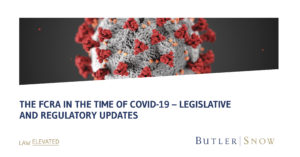The COVID-19 pandemic is not only a global health crisis, but it is also causing an economic crisis as businesses furlough workers or shut down completely in order to comply with “Safer at Home” or “Shelter in Place” orders and promote social distancing. In the United States, in March 2020 alone, more than 10 million people filed for unemployment benefit.
Financial institutions of all sizes have stepped up to help their customers. Many have offered to defer mortgage payments and work with their customers on other outstanding loans and lines of credit. Federal regulators have ordered Fannie Mae and Freddie Mac to offer homeowners flexibility, including reduced or paused payments for up to 12 months, in light of the crisis. The FDIC has also encouraged financial institutions to offer payment accommodations to borrowers affected by COVID-19.
Data furnishers have obligations to furnish accurate information to consumer reporting agencies under the Fair Credit Reporting Act, 15 U.S.C. § 1681, et seq. If a customer misses a payment due to the COVID-19 crisis, they might be worried about how that missed payment may affect their credit score. Credit scores are used by credit furnishers of all stripes to determine the interest rates and other terms that a customer or borrower will be offered. Payment history accounts for 35% percent of a customer’s credit score.
The Coronavirus Aid, Relief, and Economic Security (CARES) Act, passed by Congress and signed into law on March 27, 2020., contains a provision explicitly addressing the FCRA, as Butler Snow previously reported. Section 4021 of the CARES Act amends Section 623(a)(1) of the FCRA (15 U.S.C. § 1681s-2(a)(1)).
Now, a furnisher of data to the consumer reporting agencies that allows its customers to defer payments, make partial payments, modify credit terms, or makes other arrangements for its customers affected by COVID-19, should not report the account as delinquent, but should continue reporting it as current, unless the account was delinquent before the COVID-19-related deferral or modification, and has not been subsequently brought current. These new reporting requirements are retroactive to January 31, 2020 and do not apply to charged-off accounts.
The relevant language is as follows:
(F) Reporting information during COVID-19 pandemic.—
(i) Definitions – In this subsection:
(I) The term “accommodation” includes an agreement to defer 1 or more payments, make a partial payment, forbear any delinquent account, modify a loan or contract, or any other assistance or relief granted to a consumer who is affected by the coronavirus disease 2019 (COVID-19) pandemic during the covered period.
(II) Covered period.—The term “covered period” means the period beginning on January 31, 2020 and ending on the later of—
(aa) 120 days after the date of enactment of this subparagraph; or
(bb) 120 days after the date on which the national emergency concerning the novel coronavirus disease (COVID-19) outbreak declared by the President on March 13, 2020 under the National Emergencies Act (50 U.S.C. § 1601 et seq.) terminates.
(ii) Reporting – Except as provided in clause (iii), if a furnisher makes an accommodation with respect to 1 or more payments on a credit obligation or account of a consumer, and the consumer makes the payments or is not required to make 1 or more payments pursuant to the accommodation, the furnisher shall—
(I) report the credit obligation or account as current; or
(II) if the credit obligation or account was delinquent before the accommodation—
(aa) maintain the delinquent status during which the accommodation is in effect; and
(bb) if the consumer brings the credit obligation or account current during the period described in item (aa), report the credit obligation or account as current
(iii) Exception – Clause (ii) shall not apply with respect to a credit obligation or account of a consumer that has been charged-off.
Although courts have generally held that there is no private right of action for consumers against data furnishers under 15 U.S.C. § 1681s-2(a), enforcement of that section is given to state and federal governmental agencies under 15 U.S.C. § 1861s-2(c) and (d).
On April 1, 2020, however, the Consumer Financial Protection Bureau issued a Statement on Supervisory and Enforcement Practices Regarding the Fair Credit Reporting Act and Regulation V in Light of the CARES Act. In its statement, the CFPB advised that “[t]he Bureau supports furnishers’ voluntary efforts to provide payment relief, and it does not intend to cite in examinations or take enforcement actions against those who furnish information to consumer reporting agencies that accurately reflects the payment relief measures they are employing.”
The CFPB also advised that it “does not intend to cite in an examination or bring an enforcement action against a consumer reporting agency or furnisher making good faith efforts to investigate disputes as quickly as possible, even if dispute investigations take longer than the statutory timeframe” of 30-45 days.
In addition to these actions, a number of lawmakers have introduced bills that would further modify the FCRA during the COVID-19 pandemic. For example, on April 7, 2020, Rep. Katie Porter (D-CA) introduced H.R.6470 to amend the FCRA to institute a 1-year waiting period before medical debt will be reported on a consumer’s credit report and to remove paid-off and settled medical debts from credit reports that have been fully paid or settled, among other things. On April 3, 2020, Rep. Joe Neguse (D-CO) introduced H.R.6451 to amend the FCRA to prohibit debt from medically necessary procedures related to COVID-19 from being included on credit reports. And on March 27, 2020, Rep. Gregory Murphy (R-NC) introduced H.R.6413 to amend the FCRA to prohibit consumer reporting agencies from including any adverse item of information on the consumer report of an individual with respect to debt related to a COVID-19 related illness. Butler Snow is actively monitoring these and other bills.
